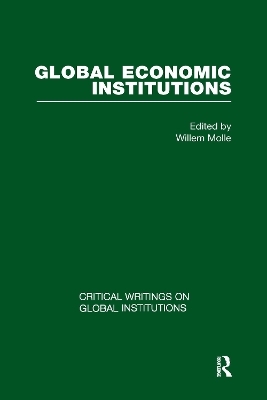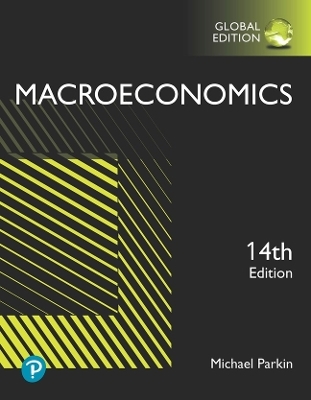
Global Economic Institutions
Seiten
2008
Routledge
978-0-415-42610-7 (ISBN)
Routledge
978-0-415-42610-7 (ISBN)
Covering canonical scholarship, this title includes work that was intended to inspire policy.
In recent years, there has been a very steep increase in globalization which, among other things, has provoked an increased interest in global economic institutions. Such interest comes notably from the emerging countries. However, researchers who wish to understand better the workings and impact of these institutions are confronted with several problems. First, many of the present features of these international organizations are rooted in their history, but access to older contributions to the literature that shed light on the reasons behind the adoption of such structures is often very difficult. Second, the relevant modern contributions appear in a bewildering array of journals, books, and reports that range over different fields such as economics, law, and political science.
The sheer scale of the growth in research output on global economic institutions - and the breadth of the field - makes this collection especially timely and welcome. It presents researchers and other users with a rationally structured set of the key contributions that together give a balanced picture of the field. Covering both canonical and cutting-edge scholarship, it also includes work that was intended to inspire policy. Among such normative studies, the best of those that have actually marked major developments and opened up new eras in international cooperation and academic thinking are included.
The materials selected and introduced by the collection’s editor, a leading scholar in the field, are organized along lines of specialization. The first volume explores general aspects that are common to all global economic institutions, while the other three each deal with a specific field. Volume two covers trade, volume three, finance and volume four, environment. Each volume presents a similar structure featuring first, the rationale of international institutions; second, the principles that inspire and orient their functioning; third, the way they are organized and structured; and fourth, their governance and instruments.
Global Economics Institutions is an essential reference collection and is destined to be valued as a vital research resource by all scholars and students of the subject.
In recent years, there has been a very steep increase in globalization which, among other things, has provoked an increased interest in global economic institutions. Such interest comes notably from the emerging countries. However, researchers who wish to understand better the workings and impact of these institutions are confronted with several problems. First, many of the present features of these international organizations are rooted in their history, but access to older contributions to the literature that shed light on the reasons behind the adoption of such structures is often very difficult. Second, the relevant modern contributions appear in a bewildering array of journals, books, and reports that range over different fields such as economics, law, and political science.
The sheer scale of the growth in research output on global economic institutions - and the breadth of the field - makes this collection especially timely and welcome. It presents researchers and other users with a rationally structured set of the key contributions that together give a balanced picture of the field. Covering both canonical and cutting-edge scholarship, it also includes work that was intended to inspire policy. Among such normative studies, the best of those that have actually marked major developments and opened up new eras in international cooperation and academic thinking are included.
The materials selected and introduced by the collection’s editor, a leading scholar in the field, are organized along lines of specialization. The first volume explores general aspects that are common to all global economic institutions, while the other three each deal with a specific field. Volume two covers trade, volume three, finance and volume four, environment. Each volume presents a similar structure featuring first, the rationale of international institutions; second, the principles that inspire and orient their functioning; third, the way they are organized and structured; and fourth, their governance and instruments.
Global Economics Institutions is an essential reference collection and is destined to be valued as a vital research resource by all scholars and students of the subject.
Erasmus School of Economics, the Netherlands
Volume I 1. Rationale 2. Principles 3. Organizations and Structures 4. Compliance 5. Results Volume II: Trade 6. Rationale (Problems, Solutions) 7. Principles 8. Organization, Operations, Structure 9. Compliance 10. Results Volume III: Finance 11. Rationale, Problems, Solutions 12. Principles 13. Organizations; Operations; Structure 14. Compliance 15. Results Volume IV: Environment 16. Rationale, Problems, Solutions 17. Principles 18. Organizations; Operations, Structure 19. Compliance 20. Results
| Erscheint lt. Verlag | 10.9.2008 |
|---|---|
| Reihe/Serie | Critical Writings on Global Institutions |
| Verlagsort | London |
| Sprache | englisch |
| Maße | 156 x 234 mm |
| Gewicht | 3492 g |
| Themenwelt | Wirtschaft ► Volkswirtschaftslehre |
| ISBN-10 | 0-415-42610-3 / 0415426103 |
| ISBN-13 | 978-0-415-42610-7 / 9780415426107 |
| Zustand | Neuware |
| Haben Sie eine Frage zum Produkt? |
Mehr entdecken
aus dem Bereich
aus dem Bereich
Media-Kombination (2021)
Cambridge University Press
61,35 €
Media-Kombination (2024)
Pearson Education Limited
103,95 €
with Pearson Etext -- Access Card -- For Microeconomics
Media-Kombination (2018)
Pearson
149,95 €


